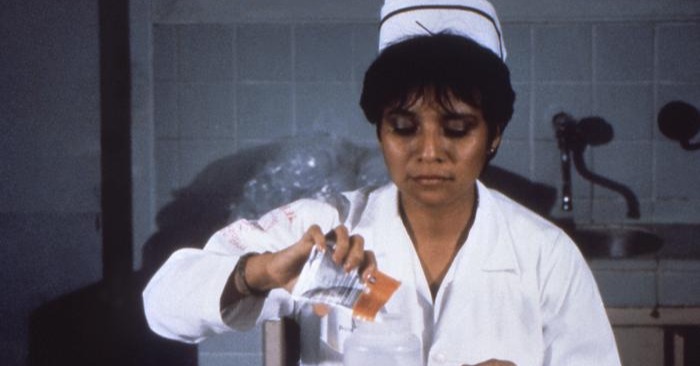
What is an MBA in Healthcare Management?
An MBA with a Healthcare Management concentration can equip you [...]

The chief nursing officer (CNO) (also known as head nurse, director of nursing, or vice-president of nursing) is responsible for running a healthcare facility’s nursing department. Though they rarely make clinical rounds, chief nursing officers have a tremendous impact on the quality of patient care. They manage the entire nursing staff and represent nurses’ interests before the executive board, fighting for better practices and resources.
In this article on chief nursing officer education, we will cover:
As a chief nursing officer, you are the straw that stirs the drink. When things go smoothly, nobody knows that you’re there. When things go badly (say, when somebody comes in with a straw up their nose and doesn’t receive adequate care), you are the one that needs to answer the tough questions and make changes.
Even though they probably won’t interact with patients daily, the CNO might be the most important nurse in the building. An article in the Columbia Nursing Magazine outlines the importance of having a good chief nursing officer. In the piece, Kevin Browne (deputy CNO for Memorial Sloan Kettering Cancer Center), describes the CNO as “the one nurse at the helm of nursing services.” He adds that the CNO is the administrator who “is required to maintain clinical and patient-care standards,” “ensures that patients [receive] safe, accurate, high-quality care,” and “sees that dollars are there to support the resources needed.”
CNOs are well-compensated for their hard work. The median salary for chief nursing officers hovers around $127,000 per year, and those in the 90th percentile earn over $200,000 (these CNOs typically work for major hospitals). Their income is similar to some other healthcare executive board members’ (according to Indeed, hospital chief compliance officers earn about $130,000 annually) and lower than others’ (Salary.com reports that a chief medical officer earns a little over $400,000 per year).
Getting hired as a CNO typically requires many years of nursing and management experience. Most CNOs work their way up the nursing ranks by starting out as registered nurses (RN), which usually means earning a Bachelor of Science in Nursing (BSN). All registered nurses must earn initial licensure by passing the NCLEX-RN exam. There may be additional requirements for the state in which you wish to practice.
You can become an RN with just an Associate Degree in Nursing (ADN), a two-year degree offered at many community colleges. It is cheaper than the four-year BSN but does not open the door to as many graduate education opportunities. Most employers and continuing education programs prefer candidates with a BSN. If you already hold an ADN, you can upgrade your degree through an RN to BSN or RN to Master of Science in Nursing (MSN) program.
Setting yourself up for advanced education is important because most CNOs become either nurse practitioners or another type of advanced practice registered nurse. These careers require a master’s in nursing and often involve choosing a practice specialty.
After advancing your career in clinical nursing, you will likely need to shift to nursing administration. Since a large part of the CNO job description involves managing a team to implement patient-centered care and better business practices, it is helpful—even a requirement in many job listings—to have mid-level nursing management experience. Working as a charge nurse (an RN with administrative responsibilities) is a good way to earn this essential experience.
The path you take to become a CNO is ultimately irrelevant, as long as you gain the proper skills and experience along the way. Some current CNOs chose to continue their education even further by earning a Doctor of Education in Nursing and becoming nursing professors. There is no single “right way” to reach the top of the nursing world.
While it is not impossible for an RN to become the head nurse, most have graduate degrees in their chosen specialty.
The fact that there is no single path to becoming a head nurse is a double-edged sword. It means you have room to study options that interest you and create a unique resume, but also that you cannot merely check boxes and expect to be a CNO.
Some of the most common graduate degrees for head nurses include:
Most doctoral degrees prepare candidates for teaching positions. Earning a DNP, however, “prepares nurse clinicians (RNs) or advanced practice nurses (APRNs) to provide fully accountable and comprehensive care to patients,” according to Columbia University.
DNP programs take three to four years to complete and prepare students for a career as an advanced practice registered nurse (APRN) with specialties like:
You can start DNP a program with just a bachelor’s degree or even just an RN certification. It’s not like a PhD program that requires years and years of education beforehand. The qualities DNP programs look for are mostly experiential.
Schools with well-known programs include:
Like the DNP, an MSN is designed specifically for working nurses. The degree generally takes between two and three years to earn. MSN programs prepare students to be nurse practitioners and other advanced practice registered nurses; it leads to careers in such fields as:
The benefit of specialized careers (in addition to receiving a raise) is that they offer more responsibility and autonomy. You can prove your leadership abilities to both your employer and fellow nurses, an essential qualification for CNOs.
Additionally, an MSN degree will prepare you to step into a role as a nursing administrator, which involves many of the same budgetary and managerial duties as a head nurse.
Schools that offer MSN degrees include:
The Master of Health Administration (MHA) degree focuses more on the business side of things than on actual nursing. It prepares students (from all types of backgrounds) for healthcare leadership roles.
There are a number of other business-focused degrees that can prepare students for the CNO role. They include:
It is possible to become a CNO without attending a graduate program that focuses strictly on nursing. Sometimes having a management degree (or even post-graduate certificate) could set you apart. It is not unheard of for nurses to earn MBAs on their way to leadership positions.
Schools with business-focused nursing programs include:
Unlike the DNP, a Doctor of Philosophy (PhD) in Nursing prepares students mostly for a career in research or academia. Graduates can also become the vice-president of a hospital or continue a career in nursing.
Many programs admit only nurses who have already earned a graduate degree (either an MSN or DNP), but some are open to bachelor’s degree-holders. Some programs are offered both in-person and online, since gaining experience on clinical rotations is not the goal. The length of a PhD in nursing program depends on the amount of education that you arrive with and whether you study full- or part-time. In general, the degree takes between three and six years to complete.
Some careers open to those with a nursing PhD include:
A nurse with a PhD can undoubtedly become a CNO, even if it isn’t the most common end result.
Some colleges and universities with nursing PhD programs include:
Aspiring CNOs might earn any number of specialty certifications, though most apply to clinical positions. For instance, emergency nurse practitioners take the ENP exam.
Once again, your specialty doesn’t really matter. It’s more important to prove that you specialize in something. If you want to be the CNO of a children’s hospital, then you might want to look into being a pediatric nurse practitioner. Even then, it’s not a requirement.
What many head nurses do have are executive administration-specific certifications. Being certified is not necessary, but it is an excellent way to supplement a graduate degree (in fact, most certifications require a graduate degree to be eligible).
Some of examples of specialty leadership certifications include:
Perhaps the most popular of all these is the NEA-BC, which “provides a valid and reliable assessment of the entry-level clinical knowledge and skills of the nurse charged with the managing the daily operations of a unit or service line.”
Aspiring CNOs should also consider joining a professional organization. Memberships not only demonstrate dedication to the craft but also provide networking and continuing education opportunities.
Major organizations include:
Chief nursing officers don’t just have an impact on the nurses and patients under jurisdiction; the changes they make can have an effect on the medical industry as a whole. “CNOs know what needs to occur not only in terms of business and finance but also, and most importantly, in developing models of care that are going to drive desired outcomes,” says Kerri Scanlon, CNO for North Shore University Hospital, in the Columbia Nursing Magazine article. “To me, that’s the greatest indicator of exceptional nursing.”
(Last Updated on February 26, 2024)
Questions or feedback? Email editor@noodle.com

An MBA with a Healthcare Management concentration can equip you [...]

Education requirements for nurses in the U.S. are becoming more [...]

Healthcare management in the U.S. is exceedingly complex. Medical facilities [...]

A Doctor of Nursing Practice (DNP) degree qualifies you for [...]

The Doctor of Nursing Practice (DNP) is a terminal practice-level [...]
Categorized as: Advanced Practice Nursing, Nursing Administration & Leadership, Nursing & Healthcare